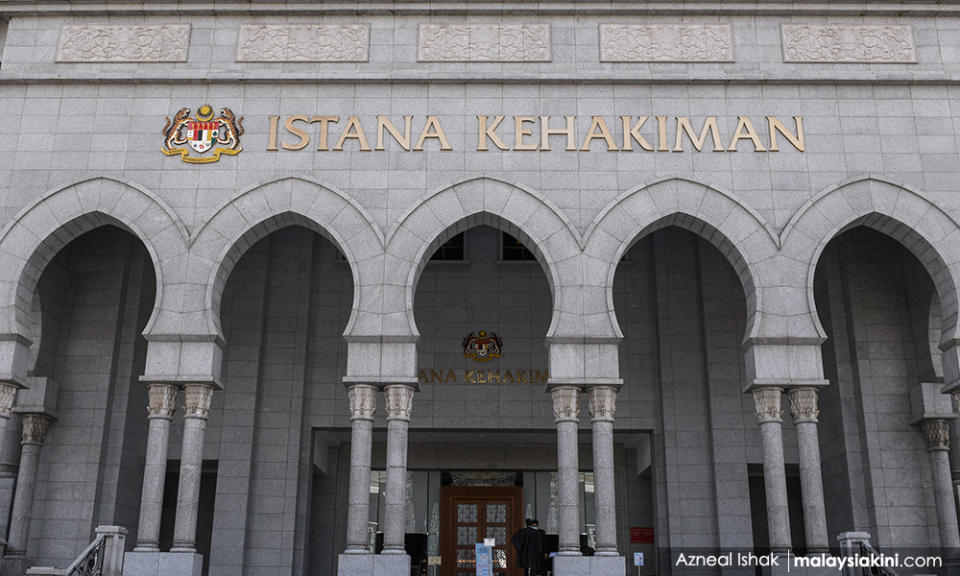Judgment reserved in challenge against S'gor law criminalising unnatural sex

The Federal Court has reserved judgment on a man’s legal challenge against the validity of the Selangor state law criminalising unnatural sex.
A nine-judge bench chaired by Chief Justice Tengku Maimun Tuan Mat reserved the decision following submissions by parties today.
Others on the bench were Court of Appeal President Rohana Yusuf, Chief Judge of Malaya Azahar Mohamed, Chief Judge of Sabah and Sarawak Abang Iskandar Abang Hashim, and Federal Court judges Mohd Zawawi Salleh, P Nallini, Vernon Ong Lam Kiat, Zabariah Mohd Yusof, and Hasnah Mohammed Hashim.
The applicant was represented by counsel Malik Imtiaz Sarwar.
The two respondents, the Selangor government and Selangor Islamic Religious Council (Mais), were represented by state legal advisor Salim Soib @ Hamid and Halimatunsa’diah Abu Ahmad respectively.
On May 27, the Federal Court granted leave for the legal challenge filed by the man, who was charged in the Selangor Syariah High Court with attempting to commit unnatural sexual intercourse.
The man’s application sought to challenge the validity of Section 28 of the Syariah Criminal Offences (Selangor) Enactment 1995, which criminalises "sexual intercourse against the order of nature".
The applicant is one of 11 accused charged in the Selangor Syariah High Court last year. His trial has been stayed pending the outcome of this application.
He was charged with "attempting to commit" sexual intercourse against the order of nature with "certain other male persons" in November 2019 in a house in Selangor.

Lawyer Surendra Ananth, who is also representing the applicant, was reported to have explained that the grounds of the challenge are that the Selangor state legislative body has no power to enact Section 28 because it pertains to criminal law, which falls under federal jurisdiction, and that there is already a federal law on unnatural sex in the Penal Code.
This case, Surendra said, is only to question the constitutionality of Section 28 of the Syariah Criminal Offences (Selangor) Enactment 1995, but not Section 377 of the Penal Code.
The 11 men were charged in batches in the Selangor Syariah High Court in August 2019.
Eight of them were charged under Section 28, read together with Section 52 of the Syariah Criminal Offences (Selangor) Enactment 1995.
Meanwhile, three of them were charged under Section 46 of the same enactment for abetment.
Five among the 11 pleaded guilty and were sentenced on Nov 7, 2019.
According to Reuters, the Selangor Syariah Court sentenced four of the men to six months in jail and six strokes of the cane as well as fines of RM4,800. Another man was sentenced to seven months' jail, six strokes of the cane and a RM4,900 fine.
Meanwhile, when met after Federal Court proceedings today, Malik explained they submitted that only Parliament has the exclusive power to enact laws that criminalise unnatural sex as it pertains to the justice system.
“The criminal system of law is in the hands of Parliament. Parliament has the exclusive power to enact laws pertaining to the justice system, such as prosecution, sentencing, everything.
“We have offences involving Islam that the state (legislature) can enact.
“The question now before the court is how to reconcile the two powers (Parliament and state legislature),” he said.
Malik added they submitted that the offence of unnatural sex is one that can only be legislated by Parliament, per the federal list in the Federal Constitution.
He noted that the case before the apex court now is an opportunity to once and for all address the question on how to balance between the two jurisdictions of Parliament and the state legislature.
He said this is especially so when it comes to the issue of Syariah law, which falls under state jurisdiction.
When met by the media after proceedings, Salim said that the legal team for the Selangor government had submitted that the state law against unnatural sex is valid as it is against the precept of the religion.
He added they had submitted that the state legislature is empowered to enact such laws per the Ninth Schedule of the Federal Constitution, among others.
Editor's note: Based on legal advice, the commenting feature for the above article has been disabled.

